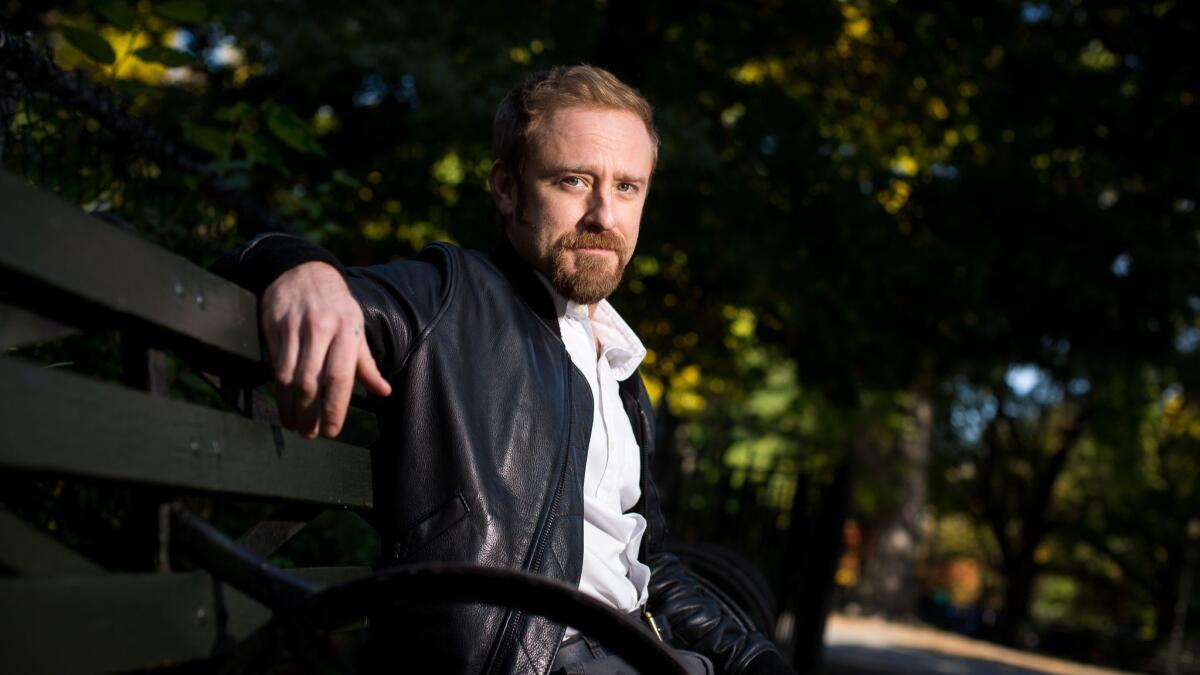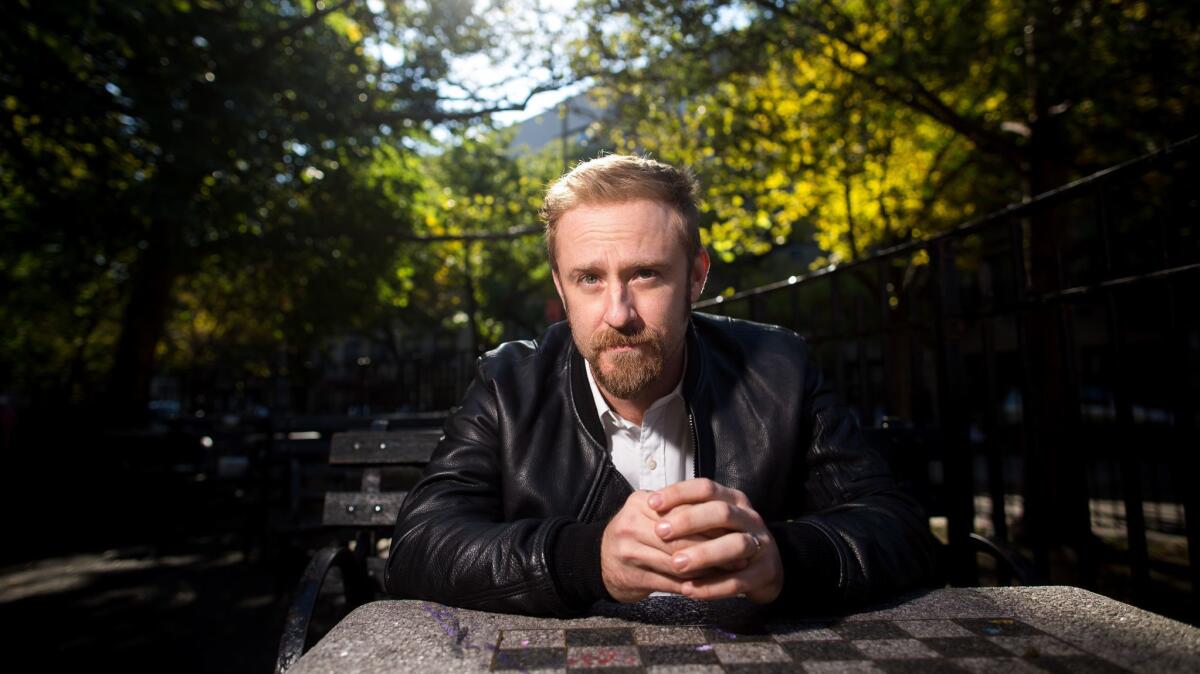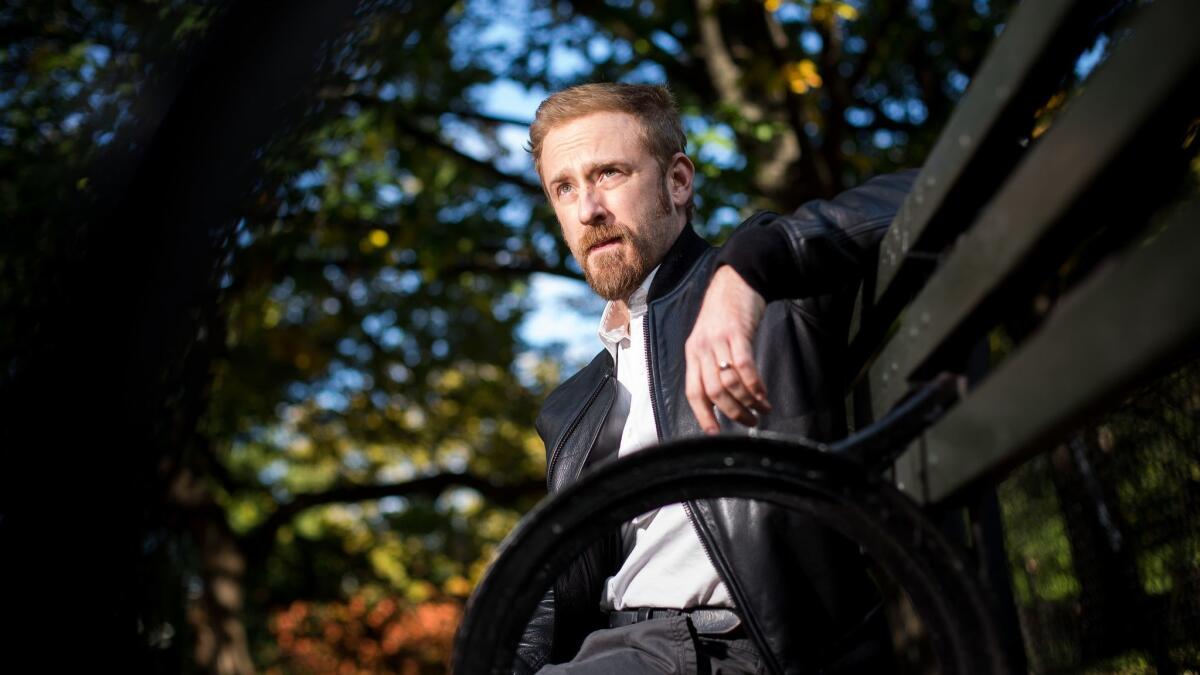Ben Foster embraces empathy and focus in his films; just don’t call him ‘intense’

- Share via
Reporting from New York — A chat with Ben Foster is not a quick, breezy BS session: From the moment he arrives in the French restaurant Lucien, he’s laser-focused, asking his own questions, then offering considered, thoughtful answers. Foster started out on the Disney TV series “Flash Forward” as a teen and today plays complicated men that bend without breaking under stress in movies like “Hell or High Water” and, most recently, “Leave No Trace,” written and directed by Debra Granik. He spoke with The Envelope about being described as intense, new fatherhood (with his wife, actress Laura Prepon) and finding peace among trees.
A great deal of “Leave No Trace” takes place out in the lush woods of the Pacific Northwest, where your character, Will, and his daughter, Tom, live. Are you an outdoorsy person?
I’m drawn into the woods, bodies of water, the desert. I found a lot of creativity in being in those spaces. I used to live in L.A. for about 13 years, actually, and when I had enough of it, I would find myself driving north with an impulse: “I need to see trees.” Quite often when I find myself in pictures and films, I just hop the fence and go find the right tree to sit with. My mind calms and my breathing would as well, and then I’d get back into the car and go back to whatever it was I was ducking.
What was it about Tom and Will that got you excited about the script?
Debra Granik once said something to the effect of, “I just want to know how people get up in the morning.” People like Tom and Will, sure, but all people. How do you get up in the morning and face this experience? People who choose to live other [ways]. She’s urgently after some clue, and that was exciting to feel that interest and curiosity.
When people describe your performances, the word “intense” comes up a lot. Is that an accurate description of you?
Well, I give a [damn]. I hear that word a lot. But it’s a lazy word. I take great pleasure in the rigor of discovery, so that kind of concentrated attention can often be translated as intense.
“Intense” also often translates to “he’s totally method and never breaks character no matter what.”
I’m not asking people to call me Will on set but, on the other hand, everything we did in the film is done practically. I enjoyed rebuilding the campsite, digging the fire pit. These are things I can do with my body — and then the emotion of the scene travels through with less resistance. I like to collaborate, to build.

You dropped out of high school at 16 to act, but how did you talk your parents into letting that be OK? It’s not like you were living in Los Angeles or New York at the time.
It wasn’t, “I want to be a star”; it was, “I want to make things.” … As a new parent myself, I don’t think there’s a week that goes by that I don’t apologize [to my parents], and I think it’s so spectacular that they let me do that. I’m sure it would have been heartening to them if I could have gone to college, but I was really not gifted. I had some learning disabilities. I got tested, but they burned the results. They were like, “You don’t need to put that label in your head.”
Do you find there’s a through line to the roles you choose?
I’m looking for a character that walks a straight line. The human animal is peculiar and complex; in certain circumstances, we’re capable of all sorts of things. I like to practice empathy with that that might be distasteful, scary, uncomfortable. The job at its best, for me, is learning and practicing empathy.

How has becoming a father changed your perspective about the world?
I’ve never been more humble. When we were shooting “Leave No Trace,” my wife came to Portland. I’d go to work and spend my time in the woods, then come home and put my hands on my wife’s second-trimester belly and hear her kicking and listen to the heartbeat. They’re woven together. Now I’m happy about something so much more precious than I am. And I value my time more. This maybe is an evolution, a healing of the young man disease: Either you grow up or you don’t. My understanding of how fragile life is has never been louder, and I’m at peace with that.
More to Read
From the Oscars to the Emmys.
Get the Envelope newsletter for exclusive awards season coverage, behind-the-scenes stories from the Envelope podcast and columnist Glenn Whipp’s must-read analysis.
You may occasionally receive promotional content from the Los Angeles Times.










